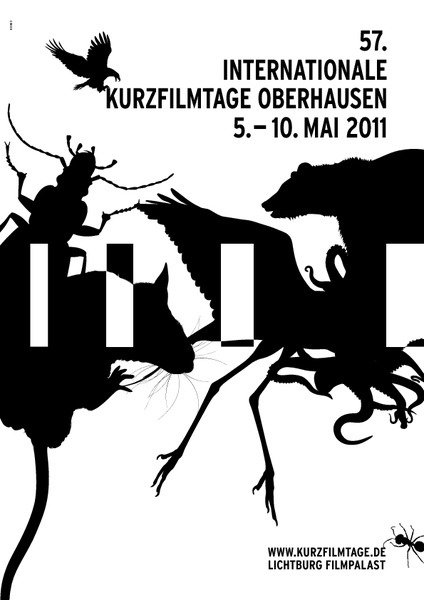57th International Short Film Festival
dal 4/5/2011 al 9/5/2011
Segnalato da
4/5/2011
57th International Short Film Festival
Lichtburg Filmpalast, Oberhausen
The festival is one of the major international crossroads for the short form, the theme in 2011 is 'Shooting Animals. A Brief History of Animal Film'. It presents a differentiated form of the short film in thematic contexts, thus creating a forum for social discussions which actually go far beyond filmrelated issues and lead to an all-encompassing dialogue on the ways and workings of film production in the arts, new technologies and science.

The theme in 2011: Shooting Animals. A Brief History of Animal Film
Just as important as the competitions at the Short Film Festival is the extensive theme.
Today, the short film branches into a host of cross-genre forms that are not shown in cinemas, be it avant-garde, advertising or scientific films. The Short Film Festival presents this differentiated form of the short film in thematic contexts, thus creating a forum for social discussions which, although originating from the topic of short film, actually go far beyond filmrelated issues and lead to an all-encompassing dialogue on the ways and workings of film production in the arts, new technologies and science.
The International Short Film Festival Oberhausen is one of the major international crossroads for the short form, unique in the range of forms and genres it presents to the public, and particularly well known for its spotlight on experiments.
In short film, anything is possible: formally, content-wise, or aesthetically. Hard to pin down, extremely open – and for that reason endlessly fascinating – short film remains an inexhaustible reservoir from which cinema, television, Internet and even the museum cull new visual languages. Oberhausen’s competitions are equally open to artistic and cinematic trends, they are exhibitions as well as film programmes. The festival is always looking for works that defy tradition, that have the courage to try out something new.
Oberhausen stands for short distances, intensive discussions, sold-out theatres and plenty of opportunities to make contacts. The four competitions, featuring some 140 new films and videos from all around the world, attract television programme editors as well as curators, festival representatives and journalists. Films vie for some 40,000 euros in prize money. The main award of the festival is the Grand Prize of the City of Oberhausen, which includes a grant of 7,500 euros, in the International Competition. A 5,000-euro prize awaits the winner of the German Competition. Other honours include the 2,500-euro ARTE Award for a European short film and the 3sat Promotional Award, likewise for 2,500 euros.
Apart from the major subject-related THEME, the Festival has presented through the years also PROFILES of important filmmakers and institutions, some of whom have dealt with the short form for decades
The profiles in 2011 are:
William E. Jones presents …, 6 — 9 may
Red Rooster 1907 — Pathé Productions In Cinema’s First Year, 6 + 9 may
Grzegorz Królikiewicz: Rebellion and Transgression, 6 + 9 may
Launched in 2006, this discussion series explores issues that concern filmmakers, curators and artists. Participants so far include Catherine David, Adrienne Goehler, Kenneth Goldsmith, Alexander Horwath, Oskar Negt, Jonathan Rosenbaum, Martha Rosler, Hito Steyerl and Akram Zaatari.
The following topics will be discussed in 2011: 6-10 May, daily 10-12 h, Festival Space, Elsässer Str. 17, Oberhausen
The Popular Unrest — telenovelas as artistic practicle and film education, 6 May
The Moving Image and Two Separate Economies, 7 May
Cheap and Cheerful — Creative Industry or Cultural exploitation? 8 May
How Alternative Are Alternative Spaces? 9 May
Shooting Animals. A Brief history of animal film, 10 May
Since 1989, the Oberhausen Market has offered buyers, festival representatives and other trade visitors a look at the current state of worldwide short film production in a concentrated atmosphere, and to select works for their own use.
In addition to the Festival Catalogue, Oberhausen also publishes an extensive Market Catalogue each year containing crew and genre information, brief descriptions in two languages and contact addresses for each film submitted, as well as separate overviews of film schools in Germany and music videos. Indexes organized by titel, genre, director and running time facilitate working with the catalogue. The Market has established an international reputation as the largest market for German-produced short films, as well as films and videos of the most diverse formats and genres.
With its distribution service and archive, the Short Film Festival Oberhausen remains active throughout the year and not just during the festival itself. Each year, selected works from the competitions and special programmes are purchased after the festival for non-commercial distribution, finding their way to venues all over the world from Manila to New York, from Estonia to Italy.
From its initiation at the end of the 1950's, the archive grew at a rapid pace - thanks in part to successful cooperation with Eastern European countries. Starting in 1993, the general archive policy of purchasing prize-winning films was extended to include the acquisition on a loan basis of German short films for distribution purposes. The collection now amounts to more than 1,750 titles, encompassing over 2,400 prints. With over 100 films from former Yugoslavia alone, in addition to prints of films from countries ranging from Egypt to Zambia, the unique standing and significance of this international short film collection are evident.
Press contact: Sabine Niewalda, Tel. +49 (0)208 825-3073, niewalda@kurzfilmtage.de
Lichtburg Filmpalast
Elsässer Straße 26 - 46045 Oberhausen



